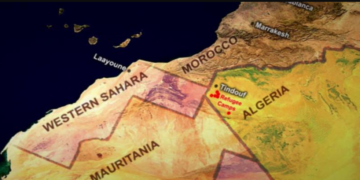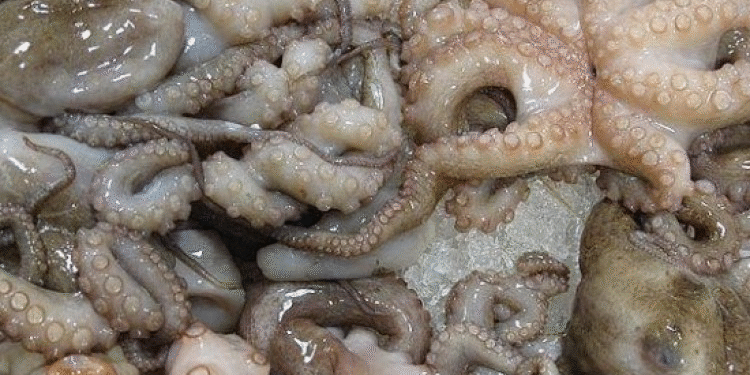The mineral riches of Western Sahara are not the only source of great wealth in the region. The marine resources of its Atlantic coast also hold tremendous economic value and could play a vital role in developing a strong national economy. Yet, these riches have never served the interests of the Sahrawi people. Instead, they have long fueled the economies of foreign powers — first colonial, then occupying — that have controlled Western Sahara for over a century.
The Sahrawi fishery wealth, which rightfully belongs to the Sahrawi people, continues to be exploited and looted without their consent or benefit.
⸻
An Ocean of Wealth: One of Africa’s Richest Fishing Grounds
Western Sahara possesses one of the richest and most productive fishing zones in all of Africa, covering an estimated 150,000 square kilometers.
The region’s ideal oceanic and climatic conditions allow for a biological productivity rate exceeding 10 tons per square kilometer per year, with a potential annual catch of 2 million tons.
The Saharan coastal waters are home to:
• Over 200 species of fish,
• 71 species of mollusks,
• 14 species of cephalopods (including octopus and squid),
• Crustaceans such as lobster and shrimp,
• As well as several rare and endemic species.
This extraordinary biodiversity could have made Western Sahara a major hub for sustainable fishing, export industries, and national economic growth — if managed by its rightful owners.
⸻
Colonial and Occupation Exploitation of Sahrawi Waters
The foreign exploitation of Western Sahara’s marine resources has a long history. For decades, colonial and occupying powers have violated international law and the right of the Sahrawi people to self-determination, using the sea as a source of profit and power.
The Spanish Colonial Era (1884–1976)
Spain, which colonized Western Sahara for nearly a century, not only exploited Sahrawi waters for its own benefit but also granted fishing permits to foreign fleets, allowing them to operate freely in Sahrawi territorial waters.
By 1969, foreign and Spanish fleets were catching around 1.3 million tons of fish per year. The profits from this exploitation were kept secret, as Spain imposed a total information blackout on revenues from Sahrawi fisheries since 1966.
⸻
The Moroccan Occupation: Systematic Overfishing and Depletion
Since Morocco’s invasion of Western Sahara in 1975, the intensive and unregulated fishing of Sahrawi waters has reached alarming levels. The overexploitation of marine life — especially cephalopods like octopus and squid — now threatens the ecosystem with massive depletion and potential extinction of key species.
This exploitation occurs despite numerous international conferences under the UN Food and Agriculture Organization (FAO) calling for the protection of marine stocks and sustainable fishing practices.
Rapid Expansion of Moroccan Exploitation
Morocco has consistently downplayed the economic significance of Sahrawi fisheries, yet available data show that exploitation under Moroccan control has far exceeded that of Spain.
In Dakhla alone, between 1994 and 1995, traditional fishing output increased more than fourteenfold. Despite a 37.5% rise in profits from cephalopod sales, local Sahrawi fishermen continue to suffer from low incomes, as Moroccan monopolists control cold storage facilities and the distribution chain.
The situation worsened after the 1991 UN ceasefire, as Morocco raced to extract as much wealth as possible before any potential resolution of the conflict. By 2002, Moroccan fleets caught thirteen times more fish in Dakhla’s waters than Spain did in 1975.
⸻
Industrial Fishing and Economic Profits
In the early 2000s, Moroccan fishing activity in occupied Sahrawi waters expanded at a staggering rate:
• 2000: 900,000 tons of fish caught.
• 2002: 66% increase in total catches.
• 2004: Estimated increase of 122%, bringing annual revenues between $1.7 and $2.3 billion USD.
If Morocco continues at this pace, the deep-sea and migratory fish stocks of Western Sahara will face the same fate as the octopus and squid populations — near collapse.
⸻
Environmental and Economic Catastrophe on the Horizon
Overfishing in Western Sahara’s waters has already caused a severe decline in marine biodiversity, particularly in octopus and squid populations.
In 2003, catches of these species fell by 50% in Dakhla, the region most favorable for octopus reproduction, while smaller species virtually disappeared from Boujdour and Laayoune.
According to the Moroccan National Institute for Marine Research (INRH) in 2003:
• Octopus production dropped by 50%
• Squid by 78%
• Deep-sea fishing overall by 66%
This environmental degradation threatens not only the ecological balance but also the economic future of the region.
By allowing foreign fleets — under Moroccan-issued licenses — to continue plundering Sahrawi waters, the occupying authorities are driving Western Sahara toward an irreversible environmental and economic disaster.
⸻
Conclusion: A Plundered Sea, A Silenced People
The rich waters of Western Sahara should have been a source of prosperity for the Sahrawi nation — providing jobs, food security, and sustainable development.
Instead, they have become a symbol of exploitation, reflecting the broader injustice endured by the Sahrawi people under occupation.
From the minerals beneath the sands to the fish beneath the waves, Western Sahara remains a land — and sea — of stolen wealth awaiting justice and rightful sovereignty.
⸻
Western Sahara fisheries, Sahrawi marine wealth, Boujdour fishing zone, Dakhla octopus, Moroccan occupation, overfishing in Western Sahara, cephalopod depletion, Sahrawi coast, FAO marine conservation, plundered resources.







